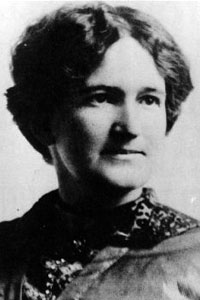“People must know the past to understand the present, and to face the future;” a quote from the writings of Nellie McClung. So too must we know Nellie McClung to understand the political and social history of Canada.
Born on a Grey County farm in Ontario, Nellie Mooney came to Manitoba in 1880. The family settled in a homestead community in the Souris Valley. At the age of 16 she enrolled in Manitoba Normal School, obtained her teaching certificate and later taught at Manitou. Here she met and married Wesley McClung. Nellie became a leading Canadian novelist, well known for her strong opinions on prohibition and social reform. In 1911 the McClungs moved to Winnipeg, here she began her long struggle for the recognition of women’s rights. She was sure that to correct social injustice, women had to have the right to vote. To this end Nellie McClung became an active member of the Political Equality League. Today, the women of Canada can thank Nellie McClung and her associates for giving them the right to vote.
Following her triumph in Manitoba, the McClungs moved to Edmonton where she was elected a member of the legislature in 1921. With the assistance of Emily Murphy, Canada’s first woman magistrate, Nellie helped to fight for the female right to sit in the Senate. Again the McClungs moved, this time to British Columbia where she died in 1951. In addition to careers in writing, teaching, homemaking, politics and crusading she served as the only woman on the Dominion War Council in 1918, the only member of her sex to represent Canada at the Ecumenical Council of Methodist Church in 1921, first woman on the Canadian Broadcasting Corporation Board of Governors and Canada’s only woman representative at the League of Nations in 1918.


